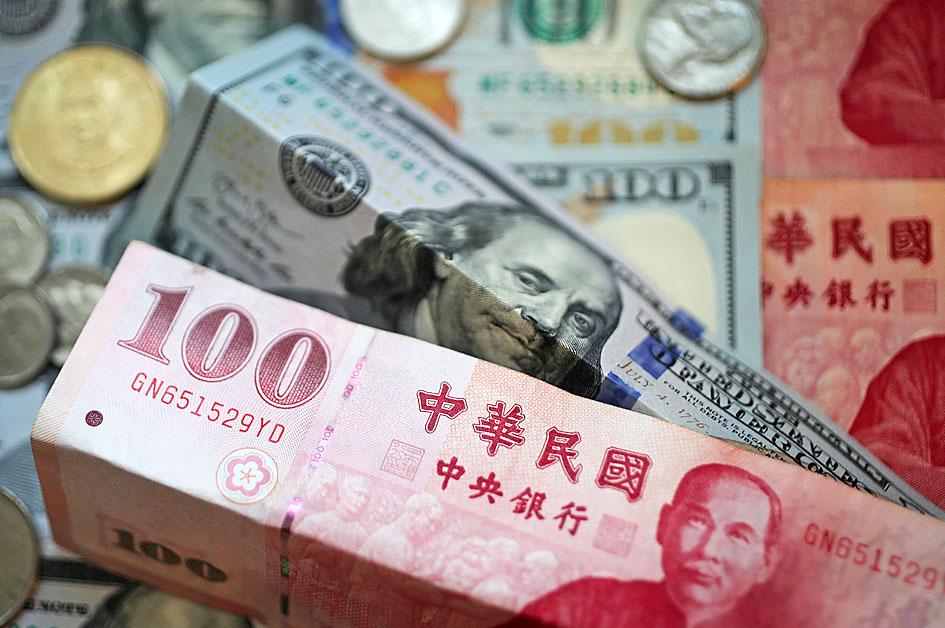Taiwan’s foreign-exchange reserves last month rose by US$1.08 billion to a record US$548.41 billion, as major reserve currencies appreciated against the US dollar and management of foreign-exchange reserves generated some gains, the central bank said yesterday.
The reserves increased for a fifth consecutive month, meaning that Taiwan remained the world’s fifth-largest holder of foreign reserves after China, Japan, Switzerland and India, the central bank said.
The New Taiwan dollar rose 0.36 percent against the US dollar last month, while the British pound, euro and Chinese yuan gained 1.25 percent, 0.35 percent and 0.11 percent respectively, Department of Foreign Exchange Director-General Eugene Tsai (蔡炯民) said.

Photo: CNA
Supply and demand remained fairly balanced, with foreign portfolio managers wiring abroad gains valued at US$4.09 billion, Tsai said.
Local shares, debts and local currency deposits held by foreign investors last month totaled US$754.5 billion, an increase of 7 percentage points, or US$36.3 billion, from November, Tsai said.
The balance constituted 138 percent of the nation’s foreign-exchange reserves — an acceptable range, he said, adding that the ratio in South Korea is about 200 percent.
Last year, foreign-exchange reserves increased US$18.5 billion, down from an increase of US$51.79 billion in 2020, Tsai said.
The difference was due to better supply and demand last year, Tsai said.
The US$51.79 billion increase in foreign-exchange reserves in 2020 was the highest since the 2008-2009 global financial crisis, central bank data showed.

TARIFFS: The global ‘panic atmosphere remains strong,’ and foreign investors have continued to sell their holdings since the start of the year, the Ministry of Finance said The government yesterday authorized the activation of its NT$500 billion (US$15.15 billion) National Stabilization Fund (NSF) to prop up the local stock market after two days of sharp falls in reaction to US President Donald Trump’s new import tariffs. The Ministry of Finance said in a statement after the market close that the steering committee of the fund had been given the go-ahead to intervene in the market to bolster Taiwanese shares in a time of crisis. The fund has been authorized to use its assets “to carry out market stabilization tasks as appropriate to maintain the stability of Taiwan’s

STEEP DECLINE: Yesterday’s drop was the third-steepest in its history, the steepest being Monday’s drop in the wake of the tariff announcement on Wednesday last week Taiwanese stocks continued their heavy sell-off yesterday, as concerns over US tariffs and unwinding of leveraged bets weighed on the market. The benchmark TAIEX plunged 1,068.19 points, or 5.79 percent, to 17,391.76, notching the biggest drop among Asian peers as it hit a 15-month low. The decline came even after the government on late Tuesday authorized the NT$500 billion (US$15.2 billion) National Stabilization Fund (國安基金) to step in to buoy the market amid investors’ worries over tariffs imposed by US President Donald Trump. Yesterday’s decline was the third-steepest in its history, trailing only the declines of 2,065.87 points on Monday and

TARIFF CONCERNS: The chipmaker cited global uncertainty from US tariffs and a weakening economic outlook, but said its Singapore expansion remains on track Vanguard International Semiconductor Corp (世界先進), a foundry service provider specializing in producing power management and display driver chips, yesterday withdrew its full-year revenue projection of moderate growth for this year, as escalating US tariff tensions raised uncertainty and concern about a potential economic recession. The Hsinchu-based chipmaker in February said revenues this year would grow mildly from last year based on improving supply chain inventory levels and market demand. At the time, it also anticipated gradual quarter revenue growth. However, the US’ sweeping tariff policy has upended the industry’s supply chains and weakened economic prospects for the world economy, it said. “Now

An employment discrimination lawsuit against contract chipmaker Taiwan Semiconductor Manufacturing Co (TSMC, 台積電) might soon be expanded after a hearing in a federal court in San Jose, California, on Tuesday to add 15 plaintiffs to the case. According to a court document, the lawsuit, which was refiled in November last year as a form of a class action with 13 plaintiffs in California, wants to add 15 plaintiffs from Arizona, where TSMC is building up its wafer fab capacity. TSMC first committed between 2020 and last year to invest US$65 billion in three advanced wafer fabs in Arizona. It then pledged an